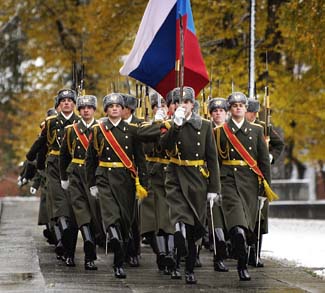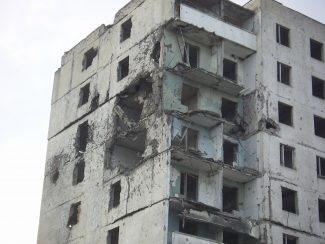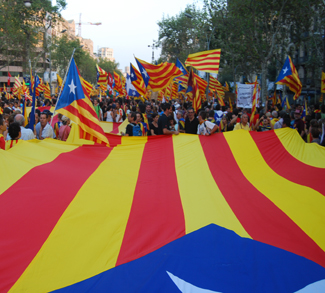Islamic State (IS) is not just a Syrian problem, or an Iraqi problem – it is a global problem. To be more specific, it is also a Russian problem. While conflict observers have noted the active participation of Caucasian insurgents, including Chechens, Circassians, and Dagestani in several theatres like Iraq and Afghanistan, their presence has also been noticed in Syria. In the early days of the Syrian civil war, there were relatively few. Recently however, this number has grown to the point where they are a significant force in the insurgent landscape in their own right. An ethnic Chechen, Umar Shishani, is reported to be one of IS leader Abu Bakr al-Baghdadi’s closest associates. Formerly of the Jaish al-Muhajireen wal Ansar or “Army of Emigrants and Supporters,” a predominantly North Caucasian group, Shishani and many of his supporters pledged allegiance to al-Baghdadi in late 2013. His group is quickly becoming one of the largest factions within IS. The security implications of this situation for Russia are quite serious.
Russia has been fighting an Islamic fundamentalist insurgency in its North Caucasus region for over a decade. In Chechnya, a sustained Islamist campaign emerged from what was originally a nationalist insurgency. The first phase saw a push for national secession during the break-up of the Soviet Union. In this conflict, Russia adopted a primarily military approach. The outnumbered but well-organized and tenacious Chechen insurgents managed to fight Russia to a standstill, resulting in the Khasavyurt Accord, a peace agreement that importantly did not settle the issue of Chechen independence. In the interim, the insurgents became increasingly divided along ideological lines, into nationalist and Islamic fundamentalist camps. During the second phase of the conflict, Russia adopted a much more sophisticated approach. It took advantage of this cleavage and, despite initial Chechen tactical successes, managed to severely reduce the insurgency over time. This was accomplished through a range of policies, the most important of which was the “Chechenization” of the conflict. In combination with lucrative economic subsidies for the region and an aggressive counterinsurgency campaign, Chechenization was effective at preventing the insurgents from rebounding from their losses and putting up the kind of direct resistance seen in the first phase of the conflict.
One consequence of Russia’s success in Chechnya was the expulsion of insurgents to surrounding areas such as Ingushetia, Kabardino-Balkaria, North Ossetia, and Dagestan. And though this expulsion did not prevent them from carrying out attacks on security forces, the scale and frequency of these attacks diminished as key leaders such as Shamil Basayev and Ibn al-Khattab were eliminated.
Over this period of time, Islamic fundamentalists remained active in several areas of the North Caucasus. One such group, under Doku Umarov, declared a pan-Caucasian Emirate. The ranks of the Caucasian insurgency grew under his leadership, but it was not enough to significantly revive the fortunes of the Chechnya campaign, and Umarov’s death in late 2013 triggered a gradual decline of the group’s ability to launch attacks.
As the struggle in Chechnya waned, many insurgents looked abroad for training, glory, and battlefield experience. At first it was Afghanistan and Iraq, but more recently Syria has become the premier destination as its civil war spirals out of control. Now the Caucasian insurgents have a new opportunity to train and operate with impunity – an opportunity they certainly did not have back home in the Caucasus.
This phenomenon highlights an important new feature of modern insurgencies: non-contiguous sanctuary. The existence of sanctuary is one of the keys to the success of an insurgency, providing a place where insurgents can rest, rearm, and train, before heading back to conduct attacks. While the conflicts in Iraq and Afghanistan provided opportunities to learn from other insurgents and gain valuable operational experience, the recent territorial gains of IS have in effect given the Caucasian insurgents a valuable sanctuary, albeit an atypical one. Historically, insurgent sanctuary has tended to be territorially contiguous. This sanctuary is not. Moreover, sanctuaries have tended to be within a functioning state in the past, meaning that counterinsurgents can employ various means, usually political, to have it denied to the insurgents.
In this case, Syria (as a whole) is a failed state. Russia can support the Assad regime politically and militarily, but there is little it can do to deny sanctuary to Caucasian insurgents.
What then is Russia to do? Having severely curtailed its domestic insurgency in Chechnya, denied the Islamists sanctuary in territorially contiguous areas, and established an alliance with the elites of the North Caucasus, Moscow is once more faced with the prospect of a reinvigorated, well-trained, and battle-hardened wave of foreign fighters returning to re-ignite the insurgency. What’s more, they have made new and powerful friends. Make no mistake, Islamic State is brutal and cruel, but it is perhaps its desire and ability to govern successfully that is the most troubling for Russia. The Caucasians are acquiring not only military skills, but political and economic ones as well. In the areas IS controls, the majority of the people (i.e. Sunnis) are adjusting to life under their particularly harsh interpretation of Islam. Regular economic activity is taking place. It has sources of income, which by all accounts includes the oil production of several captured fields in Syria and Iraq. It has an extremely sophisticated information operations campaign as well.
It stands to reason that if IS survives the international community’s reaction to its recent games, the Caucasians will go home with a powerful patron in al-Baghdadi.
With their ideological agendas aligned (i.e. the creation of a global Caliphate), the Caucasian insurgents have made significant financial and military contributions to the IS cause. Given time, some reciprocation is likely. In several recent press releases, members of IS, including Caucasians and non-Caucasians alike, have promised to return to the North Caucasus. In one such release, Arab IS fighters, directed by the Russian-speaking cameraman (likely a North Caucasian), speak directly to Russian President Vladimir Putin, threatening to liberate Chechnya and the Caucasus. Abu Bakr al-Baghdadi has the money, the experience, and the command of a large group of fighters with which to make a major contribution to the cause in the Caucasus.
John Dyck is an outside contributor to Geopoliticalmonitor.com.




